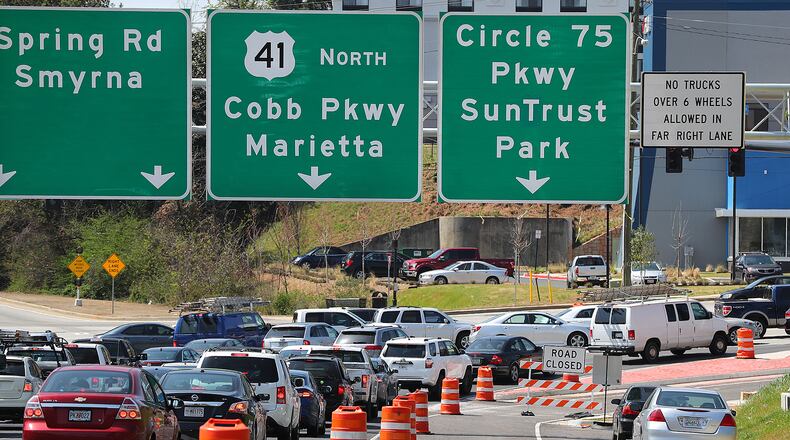Chamber official: Businesses report traffic as major impediment
The biggest complaints of companies that move to Cobb County — and those that don't — are traffic and the lack of public transit, the president and chief executive officer of the county's Chamber of Commerce says. Of company executives willing to say why they didn't move to Cobb, 45 percent said it was due to a lack of transit connectivity, the chamber's Sharon Mason said. Chamber officials met Monday with members of the Cobb County Commission to discuss the public transit legislation working its way through the Georgia General Assembly. The legislation would restructure the state's approach to public transit administration and funding. Among other things, versions of the bills in the House and Senate would change the name of the Georgia Regional Transportation Authority to Atlanta-region Transit Link, or the ATL, provide a framework for special districts that could span county lines and provide for the imposition of transit-specific local option sales taxes, The Cobb County Courier reports.
Dueling visions offered on offshore drilling plan’s impact on state
Environmental advocates and the oil industry have released dueling analyses of the costs and benefits of offshore drilling for Georgia and the other coastal states, The Savannah Morning News and savannahnow.com are reporting. A study by the international organization Oceana indicates that offshore drilling along Georgia's coast wouldn't be worth the risk. While this could produce one day's worth of oil and one day's worth of gas at the nation's current consumption rate, it also could put at risk 23,000 jobs and $1.3 billion in gross domestic product generated annually by coastal fishing, tourism and recreation, researchers for Oceana found. In contrast, a study from the American Petroleum Institute, a trade association representing all facets of the industry, emphasizes the upside of oil. Georgia could see a boost of $3.6 billion to the state's economy over two decades from offshore oil production, the report stated. That increase needn't come at the expense of other coastal industries, said Erik Milito, the institute's director of upstream and industry operations. The Gulf Coast is an example of where the oil and gas industry co-exists with tourism, commercial fishing, and the military, Milito said. In January, the Trump administration announced it would allow new offshore oil and gas drilling in nearly all U.S. coastal waters. The move would give energy companies access to leases in California for the first time in decades. It also would open up more than 1 billion aces in the Arctic and on the Eastern Seaboard of the U.S. Gov. Nathan Deal is the only coastal governor who has not weighed in on offshore drilling. He said he has concerns about drilling and on Feb. 14 ordered the Georgia Department of Natural Resources to conduct further studies. Several state lawmakers from the coast have come out in opposition to drilling.
Never miss a minute of what's happening in Georgia Politics. Subscribe to PoliticallyGeorgia.com.
About the Author
Keep Reading
The Latest
Featured



